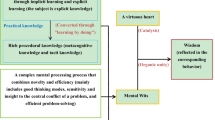Abstract
Since the 1970's the use of writing as an informal therapy has shown significant positive results. “Letters never sent: Using freewriting to tend to unfinished business” is a “writing as therapy” workshop that offers techniques to guide individuals as they write through change cycles. This workshop has provided participants a way to untangle themselves from the past and has involved them in the path to well-being. Specifically, it employs freewriting—a writing method that harnesses the internal editor, the censor, through a series of timed writing exercises. Through this freewriting workshop, participants can make significant discoveries about themselves.
Similar content being viewed by others
References
Bacigalupe, G. (1996). Writing in therapy: A participatory approach. Journal of Family Therapy, 18, 361–373.
Bastien, S., & Jacobs, A. (1974). Dear Sheila: An experimental study of the effectiveness of written communication as a form of psychotherapy. Journal of Consulting and Clinical Psychology, 42, 151.
Bennison, K. (1998). The use of a letter writing technique in individual psychotherapy. Dissertation Abstracts International, 59, 0410.
France, M.H. (1995). Letter therapy: A model for enhancing counseling interventions. Journal of Counseling and Development, 73, 317–18.
Henkin, C. S., & Walz, T. H. (1989). Writing and the elderly: Developmental perspectives and thera-peutic dimensions. Journal of Independent Social Work, 4, 61–78.
Jordan, K.B. (1998). Programmed writing and therapy with conflictual couples. Journal of Family Psychotherapy, 9, 27–39.
Jordan, K. B., & L'Abate, L. (1995). Programmed writing and therapy with symbiotically enmeshed patients. American Journal of Psychotherapy, 49, 225–236.
Kelley, P., & Williams, B. (1988). The use of assigned writings as an adjunct to therapy with individuals, couples, and families. Journal of Independent Social Work, 3, 23–38.
L'Abate, L., & Cox, J. (1992). Programmed writing: A self-administered approach for interventions with individuals, couples, and families. Pacific Grove, CA: Brooks/Cole Publishing Co.
Mazzoli, J. C. (1984). Writing as a primary mode of therapy with adolescent females who are misusing drugs/alcohol: Five case studies. Dissertation Abstracts International, 44, 2095.
McKinney, F. (1976). Free writing as therapy. Psychotherapy: Theory, Research and Practice, 13, 183–187.
Murrant, G. M., Rykov, M., Amonite, D., & Loynd, M. (2000). Creativity and self-care for caregivers. Journal of Palliative Care, 16, 44–49.
Nelson, P. (1977). Autobiography in five short chapters. In There's a hole in my sidewalk. New York: Popular Library.
Pennebaker, J. W., & Beall, S. K. (1986). Confronting a traumatic event: Toward an understanding of inhibition and disease. Journal of Abnormal Psychology, 95, 274–281.
Phillips, E. L., Gershenson, J. L., & Lyons, G. (1977). On time-limited writing therapy. Psychological Reports, 41, 707–712.
Stino, Z. (1995). Writing as therapy in a county jail. Journal of Poetry Therapy, 9, 13–23.
Tromp, S. N. (1998). Use of self-guided writing therapy as an intervention for trauma: A sample of incarcerated women. Dissertation Abstracts International, 58, 3936.
Vance, T. (1998). Letters home: How writing can change your life. New York: Pantheon Books.
vanZuuren, F. J., Schoutrop, M. J., Lange, A., Louis, C. M., & Slegers, J. E. (1999). Effective and inef-fective ways of writing about traumatic experiences: Aqualitative study. Psychotherapy Research, 9, 363–380.
Wadeson, H. (1981). Self-exploration and integration through poetry-writing. Arts in Psychotherapy, 8, 225–236.
Wolf, K. A. (1997). Women speak: Healing the wounds of homelessness through writing. Nursing and Health Care: Perspectives on Community, 18, 4–8.
Author information
Authors and Affiliations
Rights and permissions
About this article
Cite this article
McAllister, C.H., Wolff, M.C. Letters Never Sent: Tending to Unfinished Business. Journal of Poetry Therapy 15, 187–193 (2002). https://doi.org/10.1023/A:1020758304608
Issue Date:
DOI: https://doi.org/10.1023/A:1020758304608




